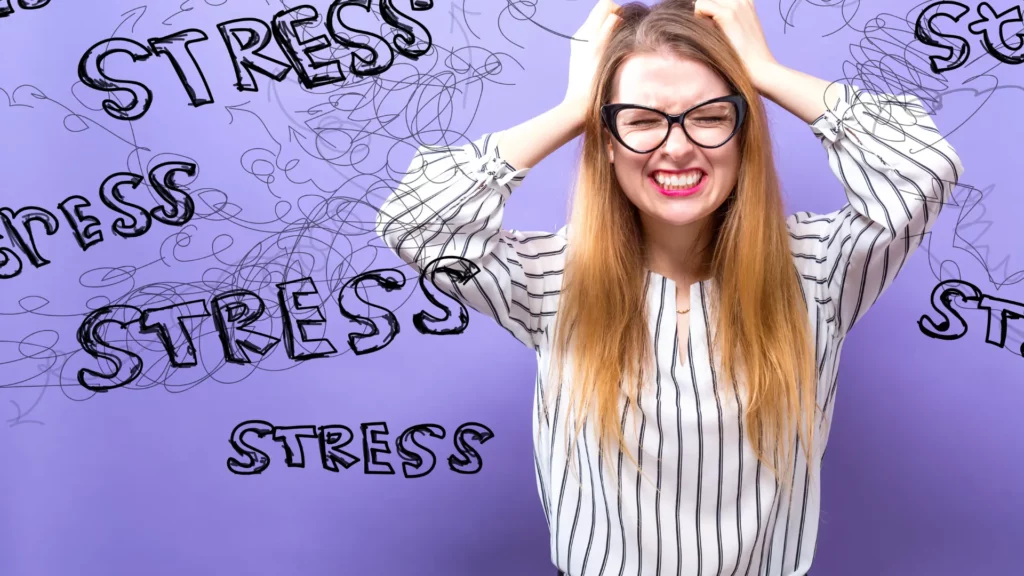In this guide
Stress-related hair loss is a concern for many, and understanding how stress impacts hair health is the first step in managing and addressing this issue. Stress-induced hair loss can manifest in various forms, including thinning, shedding, and bald patches.
The good news is that this type of hair loss is often temporary and can be managed through effective strategies.
My name is Emma Wright, your resident hair restoration specialist. Today, we’ll be looking at actionable steps to address stress-related hair loss by focusing on lifestyle changes, hair care solutions, and professional treatments.
By understanding the link between stress and hair loss, you can take proactive measures to preserve your hair health and reduce the effects of stress. The strategies outlined here are designed to help you regain control over your mental well-being, improve hair health, and minimize the impact of stress on your appearance.
Whether you are facing hair thinning or more severe hair loss, these methods will help guide you toward healthier, stronger hair.
Understanding Stress and Its Impact on Hair Health
In this section, we will explore the relationship between stress and hair loss, explaining how stress affects the body and its direct impact on the hair growth cycle. Understanding these connections will help you recognize the signs of stress-related hair loss and take proactive steps to address it.
What is Stress?
Stress is a natural response of the body to external pressures or challenges, often referred to as stressors. These stressors can be acute (short-term) or chronic (long-term), and both types have an impact on your physical and mental health.
While acute stress may help the body react quickly to a threat, chronic stress has more damaging effects, leading to long-term health issues, including stress-related hair loss. When stress becomes prolonged, it disrupts various body systems, including the hair growth cycle.
The Link Between Stress and Hair Loss
Stress affects the body in multiple ways, one of the most noticeable being its effect on hair. The hair growth cycle is divided into three phases: anagen (growth), catagen (rest), and telogen (shedding).
Stress can push hair follicles into the telogen phase, causing hair to shed prematurely. This condition is called telogen effluvium and is a common cause of stress-related hair loss. Stress can also trigger an autoimmune response, leading to alopecia areata, where the immune system attacks hair follicles, causing patchy hair loss.
The disruption in the hair growth cycle, caused by both physical and emotional stress, can lead to significant thinning or hair loss.
Recognizing the Signs of Stress-Related Hair Loss
Stress-related hair loss often begins with increased shedding, which may be noticeable when combing or washing hair. Over time, thinning may become visible, and in severe cases, bald patches may appear.
Along with hair loss, individuals experiencing stress may show emotional and physical symptoms such as anxiety, fatigue, irritability, and headaches. Recognizing the signs early can help you take action and manage the condition effectively before it worsens.
Identifying the Root Causes of Stress
Identifying the root causes of stress is crucial in managing its impact on both your mental and physical health. By understanding the factors that trigger stress, you can take proactive steps to reduce its effects, including hair loss. Stress can arise from various personal, professional, and lifestyle-related factors, and recognizing these triggers allows you to target the underlying issues effectively.
Personal and Professional Stressors
Stress comes in many forms, and identifying its sources is the first step in managing its impact on your health. Personal and professional stressors such as work-related pressures, deadlines, and family conflicts can lead to high levels of stress.
Emotional distress caused by relationship issues or financial concerns also contributes significantly to stress. These stressors activate the body’s fight-or-flight response, leading to an increase in stress hormones, which in turn affect hair health.
If these stressors persist, they can contribute to chronic stress, which disrupts hair growth.
Lifestyle Choices Contributing to Stress
Lifestyle factors also play a significant role in increasing stress levels. Poor nutrition, lack of sleep, and inadequate physical activity can all contribute to higher stress levels, weakening your body’s ability to cope with emotional pressures.
A diet that lacks essential nutrients, combined with insufficient sleep, impairs your body’s ability to regulate stress and maintain healthy hair. Regular physical activity, on the other hand, has been shown to reduce stress hormones and promote overall health, including better hair growth.
Underlying Health Conditions
Some health conditions, such as anxiety, depression, or thyroid imbalances, can contribute to chronic stress and exacerbate hair loss. Hormonal imbalances, such as those seen during menopause or with certain medical conditions, can increase the risk of stress-related hair loss.
Consulting with a healthcare professional can help identify any underlying conditions that may be contributing to hair thinning. Understanding the role of these health issues can be crucial in addressing the root cause of your stress-related hair loss.
Effective Stress-Management Strategies for Hair Health
Effective stress-management strategies are essential for not only reducing stress but also preventing its negative impact on hair health. By incorporating these strategies into your daily routine, you can improve both your mental well-being and the health of your hair. The following methods focus on making lifestyle changes, practicing relaxation techniques, and managing time effectively to reduce stress and promote hair growth.
Lifestyle Modifications to Reduce Stress
One of the most effective ways to manage stress-related hair loss is by making healthy lifestyle modifications. A balanced diet rich in vitamins, minerals, and antioxidants supports healthy hair growth and helps reduce the impact of stress. Foods rich in omega-3 fatty acids, biotin, and zinc are particularly beneficial for hair health.
Incorporating regular physical activity into your daily routine, such as yoga, walking, or swimming, helps reduce stress hormones while boosting endorphins, which improve mood and overall well-being.
Adequate sleep is also crucial, as it allows the body to recover and repair itself, reducing the physiological effects of stress on hair.
Relaxation Techniques and Mental Health Practices
Incorporating relaxation techniques into your routine can significantly lower stress levels and support hair health. Practices like meditation, mindfulness, and deep breathing exercises help calm the mind and reduce stress hormones.
These techniques promote relaxation and improve emotional well-being, both of which are essential for managing stress-related hair loss. Yoga, in particular, combines physical activity with mindfulness and deep breathing, making it a powerful tool for reducing stress while promoting overall health.
Consistent use of these relaxation methods can help manage both stress and hair loss.
Creating Healthy Boundaries and Time Management
Learning to manage your time effectively and set healthy boundaries is essential for reducing stress. Overcommitment, lack of control over your schedule, and an inability to say no can lead to stress overload.
Time management techniques, such as prioritizing tasks, breaking them into smaller chunks, and scheduling regular breaks, help prevent burnout and alleviate stress.
Setting clear boundaries in both personal and professional life ensures that you have enough time for self-care and relaxation, which are crucial for managing stress-related hair loss.
Hair Care Solutions for Stress-Related Hair Loss

Effective hair care solutions can play a crucial role in managing stress-related hair loss. By choosing the right products and treatments, you can nourish your scalp, strengthen your hair, and promote healthy growth during stressful times. Below are some practical and professional solutions to support your hair health and reduce the impact of stress on your hair.
Scalp Health and Hair Growth Products
Using the right products is essential for promoting hair growth and reducing stress-related hair loss. There are various shampoos, serums, and oils designed to nourish the scalp and stimulate hair follicles. Ingredients like biotin, caffeine, and keratin are known to strengthen hair and improve its health.
Additionally, natural remedies such as essential oils—like rosemary, peppermint, or lavender—can help increase circulation to the scalp and promote healthy hair growth. Using gentle hair care products that support the scalp and hair without causing further irritation or damage is key during times of stress.
Professional Treatments for Hair Loss
For those experiencing more severe stress-related hair loss, professional treatments may be necessary. Platelet-Rich Plasma (PRP) therapy is a popular treatment where your blood is drawn, processed, and injected into the scalp to stimulate hair follicles.
Laser therapy and hair transplants are also viable options for those with significant hair loss. Consulting with a dermatologist or trichologist can help determine the most suitable treatment for your specific needs.
These professionals can tailor a treatment plan to suit your condition and ensure you get the best results.
Avoiding Hair Damage During Stressful Periods
During periods of stress, it is essential to minimize damage to your hair. Avoid excessive heat styling, as it can weaken hair and contribute to further breakage. Opt for sulfate-free shampoos that are gentle on your hair and scalp.
Protective hairstyles, such as loose braids or buns, help prevent hair breakage and minimize damage. When possible, give your hair a break from tight hairstyles and heat tools to allow it to recover and maintain its health.
Building Long-Term Resilience Against Stress
Building long-term resilience against stress is crucial for maintaining both mental well-being and hair health. By developing sustainable coping mechanisms and seeking social support, you can better manage the stresses of daily life and reduce their impact on your body, including your hair. In this section, we will explore strategies to build resilience that not only help you manage stress but also protect your hair from its damaging effects over time.
Developing Healthy Coping Mechanisms
Building long-term resilience against stress is crucial for managing stress-related hair loss. Engaging in activities that promote relaxation, such as journaling, reading, or engaging in creative hobbies, can help reduce stress levels over time.
Social activities with friends and family also provide an emotional support network that helps manage stress. Finding healthy ways to cope with stress, rather than relying on negative habits, can significantly improve both your mental well-being and your hair health.
The Role of Social Support and Therapy
Social support plays an important role in reducing stress and improving overall health. Talking to friends or family members about your stress can provide relief and help you process your emotions.
If stress becomes overwhelming, seeking professional therapy can help you develop healthier coping mechanisms. Cognitive-behavioral therapy (CBT) is a proven method for managing stress and has been shown to reduce the physical and emotional effects of stress. Therapy can help you understand and address the root causes of stress, ultimately leading to better mental health and hair health.
Monitoring Progress and Patience in the Journey to Recovery
Recovering from stress-related hair loss takes time and patience. While lifestyle changes and professional treatments can help, it may take several months to see visible results in hair regrowth.
It’s important to set realistic expectations and monitor your progress over time. Consistency is key—regularly practicing stress-reducing techniques and following a healthy hair care regimen will eventually yield positive results.
Be patient with the process, as stress-related hair loss can improve with sustained effort and time.

Emma, staff writer and
Hair Restoration Specialist.
Hi, I’m Emma! While some people can recover from stress-related hair loss naturally, there are alternative solutions if that doesn’t work for you. A hair transplant is a permanent option that can restore your confidence and give you real results.
I know how crucial it is to get the right guidance. That’s why I’m recommending a free consultation with a specialist, where you can ask all your questions and explore your options.
Conclusion
Managing stress-related hair loss is a multifaceted approach that requires both understanding and action.
By recognizing the impact of stress on hair health and taking steps to address the root causes, you can effectively manage hair loss and promote healthy hair growth.
Incorporating stress-reducing techniques, making lifestyle changes, and using appropriate hair care solutions are essential in addressing this condition. For more severe cases, professional treatments like PRP therapy or hair transplants can be considered.
Remember that managing stress is an ongoing process that requires patience and consistency. By taking a holistic approach to stress management, you can improve both your mental well-being and your hair health, reducing the effects of stress-related hair loss over time.


